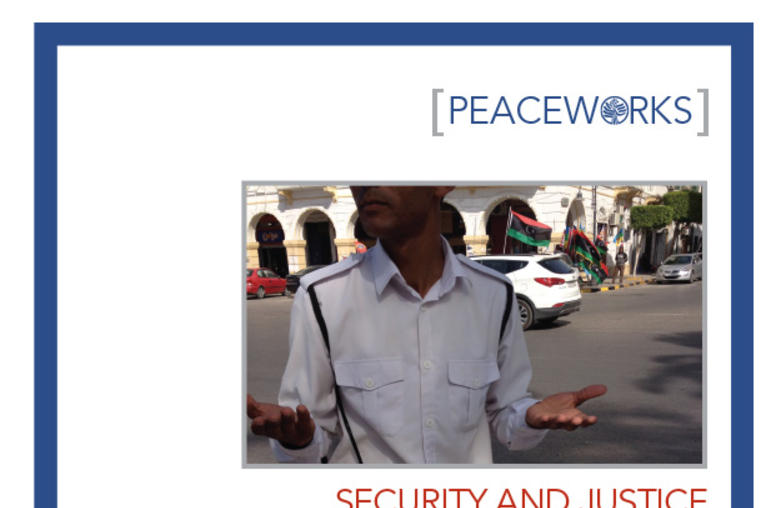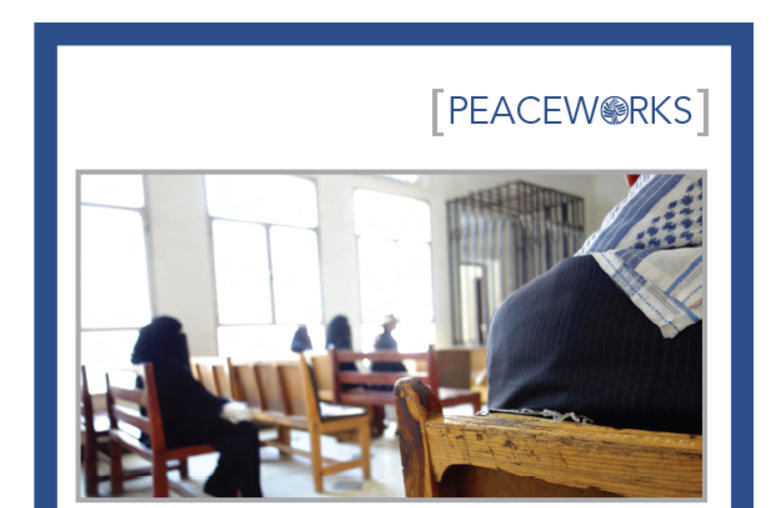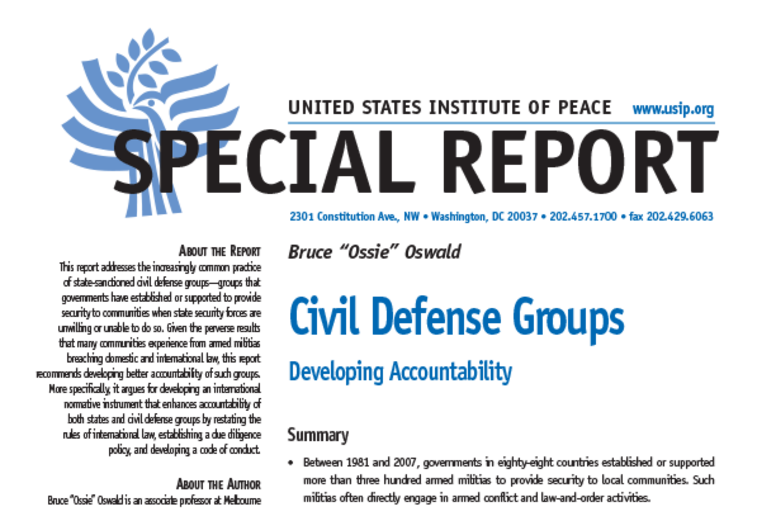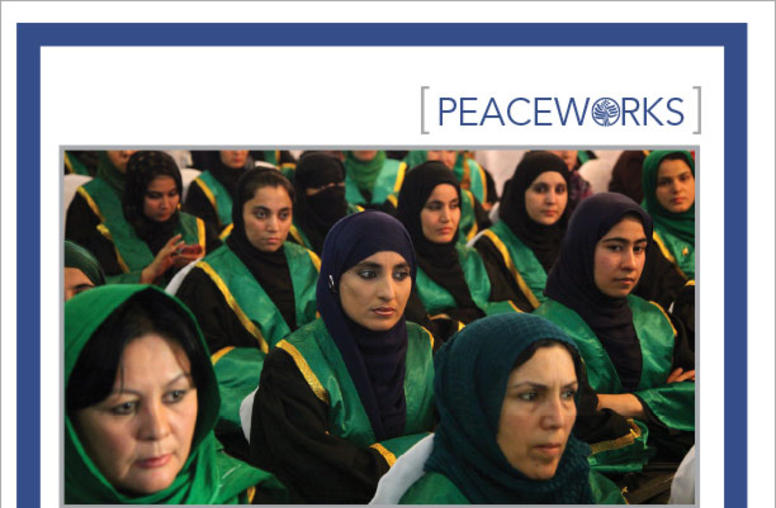Anti-Conversion Laws and Religious Freedom in South Asia and the Middle East: The Case of Abdul Rahman
J Alexander Thier testified on Friday, April 7, 2006, before the Congressional Human Rights Caucus on helping Afghans implement a legal system that understands, respects, and promotes the rule of law.
I would like to thank the members of the Congressional Human Rights Caucus, particularly the co-chairs Congressman Wolf, Congressman Lantos, Senator Brownback and Senator Harkin, and today’s chairs Congressman Akin and Congressman McIntyre for holding this hearing today on "Anti-Conversion Laws and Religious Freedom in South Asia and the Middle East: The Case of Abdul Rahman."
It is my pleasure to have this opportunity to offer you my personal views on the case of Mr. Rahman, and to suggest how we may promote serious efforts at reform to help the Afghans and others in the region create a legal system that understands, respects, and promotes the rule of law. I want to emphasize that the views I express are my own and not necessarily those of the U.S. Institute of Peace, which does not take policy positions.
The case of Abdul Rahman has highlighted the critical tension between the democratic values and human rights norms embraced by the new Afghan constitution on the one hand, and the conservative Islamic values that lie deeply embedded in Afghan law and culture. This case should serve as a warning to us about the state of individual freedoms in Afghanistan – and it should also serve as a beacon that helps us, and the Afghan government, to find a better way forward.
I hope to accomplish two things here today: First, I will attempt to explain how and why Mr. Rahman’s case emerged. Second, I offer recommendations about what we can do to improve the protection of basic freedoms in Afghanistan, and the countries of the region.
Abdul Rahman converted to Christianity some 16 years ago, a fact that arose in divorce proceedings in Kabul last month. While his ex-wife was using his conversion in an attempt to get custody of their children, a prosecutor brought charges of Apostasy against Mr. Rahman for abandoning the Islamic faith. The prosecutor claimed that Apostasy was a crime deserving the death penalty, and justified his argument by reference to provisions in Afghanistan’s new democratic constitution.
This tension within the Afghan constitution and the legal system is not an accident. It is rather a reflection of the tumult that the Afghan legal system and Afghan society are experiencing after three decades of war and political upheaval. There are factional, ethnic, and ideological power struggles underway throughout the country – and the creation and implementation of the constitution have been a central locus of those battles. The question of the role of Islam in the government and legal system is deeply tied to the legitimacy of the new Afghan government, which is attempting to balance the need for modernization with the power of conservative forces in the country. The Afghans fought a devastating was against the Soviet Union under the rubric of an Islamic jihad – and the parties that grew powerful from that conflict still control the rhetoric of Islam.
As we have experienced in our own history, the Afghan constitution is an imperfect compromise, and contains provisions that attempt to satisfy antagonistic constituencies. For instance, the preamble of the constitution requires featly to "the sacred religion of Islam" and acknowledgement of the righteousness and sacrifice of the Jihad, while also calling for a society based on the rule of law that is free of oppression, discrimination, and violence, and which protects human rights and dignity.
Some passages of the constitution do appear to protect religious freedom. Article 2 says that "followers of other religions are free to exercise their faith and perform their religious rites within the limits of the provisions of law," however, the explicit and implicit limitations in that clause do raise concern. Similarly, Article 7 says that the state shall observe international treaties and conventions, and the Universal Declaration of Human Rights. Art. 18 of that declaration, and Art. 18 of the International Covenant on Civil and Political Rights – to which Afghanistan is a state party - clearly protect freedom of conscience, and specifically the freedom to change one’s religion. These protections, however, are not incorporated into Afghan law, a fundamental step to implementing most treaty requirements.
At the same time, Afghanistan’s constitution is not a secular document. Article 1 declares that Afghanistan is an Islamic republic. Article 3 states that "no law can be contrary to the beliefs and provisions of the sacred religion of Islam." And Article 121 of the constitution gives the power of judicial review to the Supreme Court. The combination of these clauses has the effect of creating an "Islamic review" over the constitution and the laws of the country. Similar provisions are found in the constitutions of Iraq, Iran, and Egypt, among others.
The constitution also provides direct recourse to Islamic law rather than Afghan legislation, in some cases. Article 130 of the constitution gives judges the specific duty to apply the "Hanafi" school of Islamic law or Sharia when there is no provision in Afghan law that applies to a particular case. The Afghan penal code enumerates many crimes – but it intentionally leaves out crimes like Apostasy, so that Afghan judges will be able to apply Islamic law.
Leading Islamic scholars disagree about Apostasy –and there is a robust debate in the literature going back centuries. Fortunately, this leaves room for interpretations that respect basic rights. Unfortunately, however, the reality is that many Islamic scholars do believe that Apostasy is a crime punishable by death.
But, I would argue that Mr. Rahman’s case was not primarily about Islam – it was about power. This case emerged just as President Karzai was about to announce his choices for his cabinet and the Supreme Court – both of which must be approved by the parliament for the first time in Afghanistan’s history. By coincidence or design, the Rahman case has become directly tied to the question of who will lead Afghanistan’s new institutions.
The Afghan judiciary has long been the redoubt of the clergy, and has now become a stronghold of fundamentalist Islamist factions. The current leadership of the court has shown a willingness to use Islam as a bludgeon against democracy. The Rahman case is only the latest example of these ongoing efforts which have included blasphemy charges against magazine editors, an attempt to ban women singing on television, and an effort to disqualify a candidate in the Presidential elections. If this trend continues, Afghanistan’s young democracy risks being strangled in the crib.
The good news, however, is that change is possible. President Karzai has sent a slate of supreme court nominees to the legislature that contains some promising reformers. And the article of Afghanistan’s constitution that allows for reference to the sharia also requires that decisions be within the limits of the constitution and in the interests of justice. In other words, with good judges in place who respect basic freedoms, the ambiguities of the constitution allow for interpretations that will protect rights, rather than proscribe them.
But a few good judges won’t make the difference. The U.S. and its allies must partner with the Afghan government to invigorate the judicial reform process. Our primary focus should not be on "Islamic" issues – but rather on the nuts and bolts of creating a competent and legitimate judicial system – in other words the areas where we can be most effective. At the same time, we must work in a manner that bolsters, rather than undermines, the credibility of the Karzai government in the eyes of the Afghan people.
I recently returned from Afghanistan where I direct a U.S. Institute of Peace project that is helping the Afghan government to deal with the shortcomings of the current judicial system, and we hope to increase our efforts there in the future.
Our work there suggests that the new judiciary will need both political and financial support to review the qualifications of the lower court judges, facilities to train new judges and functioning courthouses in the provinces. It will need to be able to share information, laws and legal decisions among officials throughout the country and to pay judges a living wage. Everything cannot be done at once – but we can help the government to create pockets of competence throughout the country so that the Afghan people can begin to believe in government again.
Ultimately, as we have seen throughout the world, and in our own history, the rule of law requires competent and independent judges that will rule justly even when their decisions indict the powerful and defend the unpopular.
Mr. Rahman's case is a clarion call for us to help Afghanistan’s judicial system, and those of similarly situated countries in the region, if we want democracy and the rule of law to prevail.
J Alexander Thier is the senior rule of law adviser at the United States Institute of Peace. He was legal adviser to Afghanistan's Constitutional and Judicial Reform Commissions from 2002 to 2004. The views expressed in this testimony are those of the author, not the U.S. Institute of Peace, which does not take positions on policy issues.



